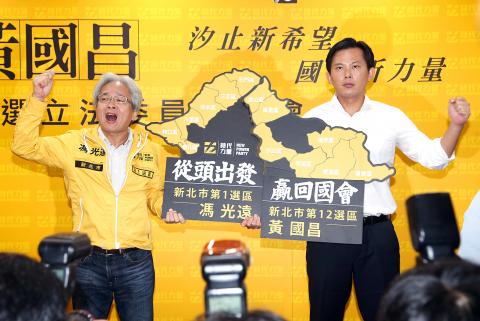Academia Sinica researcher Huang Kuo-chang (黃國昌) yesterday officially announced his candidacy for New Taipei City’s 12th constituency on the New Power Party ticket, promising to resign from his position with the nation’s top research institute before registering for the legislative elections.
“I would like to tell all my friends out there that I have decided to join politics by running for the legislative seat representing New Taipei City’s 12th constituency, which includes my hometown, Sijhih (汐止), as well as Rueifang (瑞芳), Jinshan (金山), Wanli (萬里), Pingsi (平溪), Shuangsi (雙溪) and Gongliao (貢寮) districts,” Huang said in a press conference at the Taiwan Presbyterian Church in Sijhih.
He said the nation is facing a multitude of crises: the Chinese threat, skyrocketing national debt, a pension system on the brink of bankruptcy, an unfair taxation system, low salaries, rising property prices and low food self-sufficiency.

Photo: CNA
“However, we do not see a government that can solve these problems; instead, we see collusions between the government and businesses, abuse of power and failed governance,” he said.
Huang said he decided to join the elections in the hopes of changing the legislature’s structure in his quest for a better future for the nation.
“We do not have a lot of time left; we must act now,” Huang said. “For the sake of Taiwan’s future, young people have stood up, university students have stood up and even high-school students have stood up’ now, it is time for me to stand up.”
Asked why he changed his mind after vowing last month that he would not run in the city’s 12th constituency and would throw his support behind Democratic Progressive Party (DPP) New Taipei City Councilor Shen Fa-hui (沈發惠), Huang said he had met with DPP election campaign strategy committee convener Su Jia-chyuan (蘇嘉全), who said that the DPP has decided not to nominate a candidate and to yield the constituency to Huang.

A preclearance service to facilitate entry for people traveling to select airports in Japan would be available from Thursday next week to Feb. 25 at Taiwan Taoyuan International Airport, Taoyuan International Airport Corp (TIAC) said on Tuesday. The service was first made available to Taiwanese travelers throughout the winter vacation of 2024 and during the Lunar New Year holiday. In addition to flights to the Japanese cities of Hakodate, Asahikawa, Akita, Sendai, Niigata, Okayama, Takamatsu, Kumamoto and Kagoshima, the service would be available to travelers to Kobe and Oita. The service can be accessed by passengers of 15 flight routes operated by

Alain Robert, known as the "French Spider-Man," praised Alex Honnold as exceptionally well-prepared after the US climber completed a free solo ascent of Taipei 101 yesterday. Robert said Honnold's ascent of the 508m-tall skyscraper in just more than one-and-a-half hours without using safety ropes or equipment was a remarkable achievement. "This is my life," he said in an interview conducted in French, adding that he liked the feeling of being "on the edge of danger." The 63-year-old Frenchman climbed Taipei 101 using ropes in December 2004, taking about four hours to reach the top. On a one-to-10 scale of difficulty, Robert said Taipei 101

MORE FALL: An investigation into one of Xi’s key cronies, part of a broader ‘anti-corruption’ drive, indicates that he might have a deep distrust in the military, an expert said China’s latest military purge underscores systemic risks in its shift from collective leadership to sole rule under Chinese President Xi Jinping (習近平), and could disrupt its chain of command and military capabilities, a national security official said yesterday. If decisionmaking within the Chinese Communist Party has become “irrational” under one-man rule, the Taiwan Strait and the regional situation must be approached with extreme caution, given unforeseen risks, they added. The anonymous official made the remarks as China’s Central Military Commission Vice Chairman Zhang Youxia (張又俠) and Joint Staff Department Chief of Staff Liu Zhenli (劉振立) were reportedly being investigated for suspected “serious

Taiwanese and US defense groups are collaborating to introduce deployable, semi-autonomous manufacturing systems for drones and components in a boost to the nation’s supply chain resilience. Taiwan’s G-Tech Optroelectronics Corp subsidiary GTOC and the US’ Aerkomm Inc on Friday announced an agreement with fellow US-based Firestorm Lab to adopt the latter’s xCell, a technology featuring 3D printers fitted in 6.1m container units. The systems enable aerial platforms and parts to be produced in high volumes from dispersed nodes capable of rapid redeployment, to minimize the risk of enemy strikes and to meet field requirements, they said. Firestorm chief technology officer Ian Muceus said